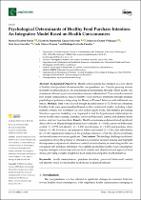Psychological Determinants of Healthy Food Purchase Intention: An Integrative Model Based on Health Consciousness

View/
Author(s)
Escobar-Farfán, Manuel
García-Salirrosas, Elizabeth Emperatriz
Guerra-Velásquez, Mauricio
Veas-González, Iván
Gómez-Bayona, Ledy
Gallardo-Canales, Rodrigo
Date
2025-07-01Subject
Metadata
Show full item recordPublisher
MDPI
Journal
Nutrients
Abstract
Health consciousness has emerged as a key driver of healthy food purchase decisions in the post-pandemic era. Despite growing interest in health-oriented products, the psychological mechanisms through which health consciousness influences purchase intentions remain understudied. This research examined how health consciousness impacts healthy food purchase intentions through multiple psychological pathways, integrating the Theory of Planned Behavior with additional constructs. Methods: Data were collected through an online survey of 573 Peruvian consumers. Healthy foods were operationalized based on their nutritional quality, including a high nutrient content, low saturated fats and added sugars levels, and minimal processing. Structural equation modeling was employed to test the hypothesized relationships between health consciousness, attitudes, perceived behavioral control, self-identity, moral norms, and purchase intention. Results: Health consciousness demonstrated significant direct effects on all psychological mediators (attitudes: β = 0.643; perceived behavioral control: β = 0.593; self-identity: β = 0.638; moral norms: β = 0.613) and purchase intention (β = 0.163). However, only perceived behavioral control (β = 0.261) and self-identity (β = 0.107) significantly influenced the purchase intention, while the effects of attitudes and moral norms were non-significant. Conclusions: The findings challenge traditional assumptions about the primacy of attitudes in consumer decision making and highlight the importance of perceived behavioral control and self-identity in translating health consciousness into purchase intentions. Successfully promoting healthy food consumption requires strategies addressing both practical barriers and identity-related aspects of food choice, providing valuable insights for food marketers and public health initiatives.
Type
info:eu-repo/semantics/article
Rights
info:eu-repo/semantics/openAccess
Language
eng

